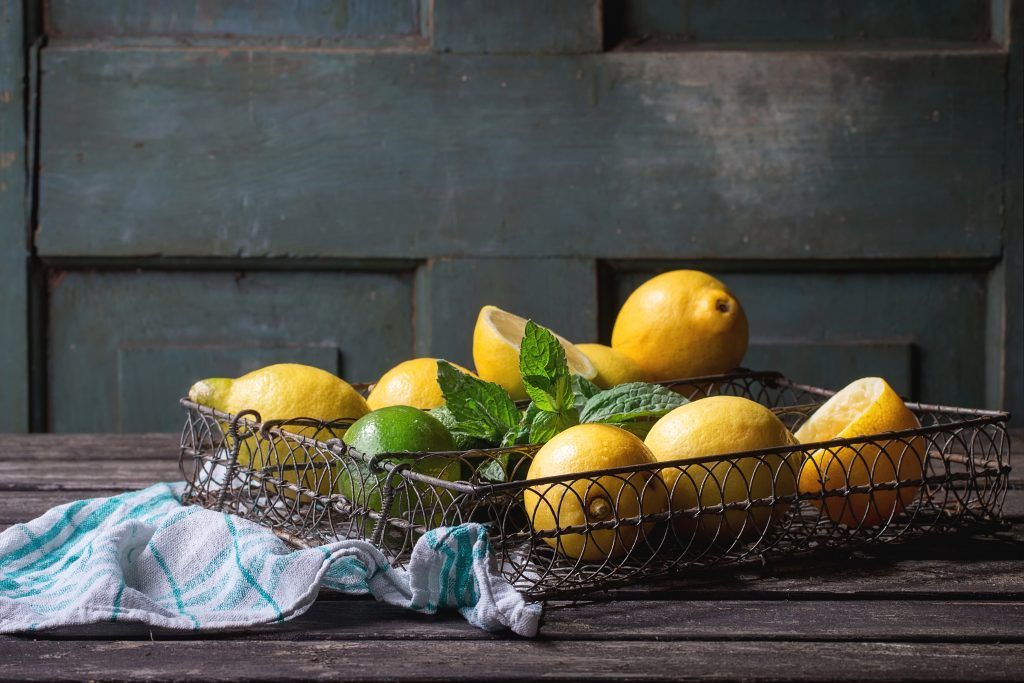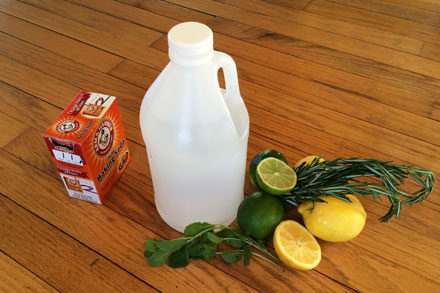
When I was a child, my life’s mission was to somehow escape the weekly housecleaning chores. I came to the battlefield heavily armed, with all sorts of arguments and procrastination devices up my sleeve, but my mother was patient and persistent, and my evasion tactics never won the day. Thus each Saturday morning, I found myself fuming and toiling through endless vacuuming, scouring, and dusting.
I’ll admit that today when I clean, it’s still with a grudging heart. It takes a fond appreciation for the gleam of a scrubbed sink, the shine of a polished floor, or the scent of a laundered sheet to motivate me to action. The only other thing that makes household cleaning bearable is getting to concoct my own natural herbal cleaners.
The Chemistry of Clean
Cleaning is removing matter that has somehow ended up where it’s not supposed to be. Whether it’s dirt, dander, hair, grease, oil, wax, food particles, rock, rust, excrement, mold, bacteria, or yeast, the unifying factor of this unwanted matter is that it needs to go!
All cleaners begin with a solvent. Solvents are carrier solutions that dissolve the unwanted matter and so help “carry” it away. When we’re cleaning the house, our solvent is usually water. Pure water is an amazing solvent. Given enough time, water can etch canyons through mountains. Since we usually don’t have that kind of time, we mix in a few additional ingredients to expedite the process.
• Acids break down inorganic materials such as rust or minerals. Acids are common in mineral deposit removers, toilet bowl cleaners, tile cleaners, and mold solutions. CLR is an acid-based cleaner.
• Bases (a.k.a. alkalis) remove greasy, waxy, and oily soils from surfaces. Ammonia and bleach are alkali-based cleaners, and oven cleaners, all-purpose sprays, and laundry detergents are all basic solutions.
• Surfactants break up and lift away unwanted matter so it dissolves into the solvent more readily. Any cleaner that contains a soap or detergent contains a surfectant.
Tools of the Green Trade
Today’s commercial cleaning products often contain chemicals of varying toxicity, and a quick web search will turn up all kinds of warnings on the potential ill health effects of these chemicals. Luckily, we don’t have to use highly toxic cleaners to get a good deep clean. There are many simple and naturally safe alternatives for us to use.
• Distilled white vinegar contains acetic acid produced from ethanol fermentation (by acetic acid bacteria). It has antifungal and antimicrobial properties and can eliminate mineral deposits from sink and bathtub fixtures. It also dissolves grease and inhibits mold.
• Baking soda (sodium bicarbonate) is a naturally occurring mineral. It is a mild alkali useful for dissolving grease and dirt. It also deodorizes and provides grit for making a gentle scrub.
• Cream of tartar (potassium bitartrate) is an odorless, acidic powder that crystallizes in wine casks during grape juice fermentation. It is a good stain remover and can be used to clean metal, porcelain, and glass.
• Castile soap is a traditional hard, white soap made with olive oil and sodium hydroxide. It is a surfectant that helps loosen and wash away dirt and grease. It is a useful addition (especially in liquid form) to many homemade cleaning solutions.
• Fresh lemon or lime juice is an acidic solution and disinfectant that also leaves behind a refreshing scent.
Essential Ingredients
Herbs, or more specifically, the essential oils in herbs, are highly effective disinfectant additions to natural household cleaners. Many herbs possess potent antibacterial, antiviral, and antimicrobial properties. Studies show that herbal essential oils are as effective as common detergent solutions when it comes to killing surface-residing antimicrobials, and that herbal essential oils can reduce numbers of airborne microbes in a room. Still other studies are finding that herbal essential oils possess antimicrobial activity against antibiotic-resistant superbugs such as MRSA and VRE.
Of course, the other major advantage to using herbs is that they smell terrific! You can incorporate herbs into your household cleaning solutions either by making strong herbal teas or by adding pure (distilled) essential oils to your solutions. Lemongrass, rosemary, sage, oregano, basil, lavender, thyme, and peppermint are all powerful antimicrobials. You can use any of these herbs in the recipes for natural household cleaners.
Let’s Get Cleaning
It’s time to get to work! Generally, you should mix up your cleaners in stainless steel or glass containers rather than ceramic or plastic containers, which can absorb essential oils. Plastic spray bottles are fine for short-term storage, but you’ll want to use glass containers for longer storage. Store all cleaning products in a cool, dark location out of reach of children and pets.
If you choose to use essential oils, remember that these oils are potent! Take the usual precautions, handle with care, and follow the directions. Do not apply directly to the skin and do not ingest.
Lastly, it’s better to be safe than sorry! Test your homemade cleaning products on an inconspicuous spot before using them to make sure they won’t stain or react in unexpected ways.
It’s amazing the things in life that a healthy dose of herbs can make better. Try these recipes for happy cleaning.
All-Purpose Kitchen Spray
This disinfects countertops and other kitchen surfaces and can also can be used on painted walls and wood trim.
Combine 1 cup distilled white vinegar, 1 cup water, 10–12 drops of thyme (or basil) essential oil, and 10–12 drops of lemongrass essential oil. Alternatively, brew 1/2 cup of a strong thyme (or basil) tea and 1/2 cup of a strong lemongrass tea and mix with 1 cup distilled white vinegar. Pour into a spray bottle for use. Store in a dark glass jar in the refrigerator for up to 1 week.
For a deeper clean, add 1–2 tablespoons liquid castile soap.
Bathroom Scrubber
This is great for scrubbing countertops, tubs, and sinks.
Combine 1 cup baking soda and 1 tablespoon liquid castile soap. Slowly add warm water until you get a thick but pourable paste. Mix in 10 to 12 drops lemongrass or peppermint essential oil. Apply to surface, wait for 5 minutes, then scrub with a sponge. Rinse with water. Use fresh.
Floor Cleaner
Use this for mopping all kinds of hard-surface floors.
Combine 1 cup distilled white vinegar and 1 gallon hot water in a mop bucket. Add several drops (up to 1 teaspoon) of lavender essential oil and several drops (up to 1 teaspoon) of rosemary essential oil. Alternatively, brew 1 cup strong lavender tea and 1 cup strong rosemary tea and add to vinegar and gallon of water. Discard mopping solution after use.
Variation 1: Instead of using both herbs, keep the lavender and replace the rosemary with 1/2 cup fresh lemon juice.
Variation 2: Add 1–2 tablespoons of liquid castile soap for a deeper clean. Rinse floor with fresh water after mopping.
Glass Cleaner
Combine 1/2 cup distilled white vinegar with 2 cups water and 10–12 drops lemongrass essential oil in a spray bottle and shake well. Alternatively, brew 2 cups of strong lemongrass tea and add 1/2 cup vinegar. For really dirty (outside) windows, try adding 1 tablespoon cream of tartar. Spray on glass, then wipe clean.
Air Fresheners
The best part of a spic-and-span home is the way it smells. Here are a few tips to scent your home with herbs:
• Place a drop of your favorite essential oil on a fabric scrap and toss it in the dryer with your clothes.
• Use a muslin tea bag to create an easy sachet with your favorite dried herbs. Place sachets in linen closets, cedar chests, and sock drawers. Try tucking a lavender sachet under your pillow to help you sleep at night.
• Brew a strong tea of your favorite herbs. Pour it into a spray bottle and use daily as a natural aromatic air freshener. Alternatively, combine 1 cup of water with 10–12 drops of your favorite herbal essential oils to spritz around the house.
Two More Favorites
There are two other essential oils that get an honorable mention here, even though they’re not herbal essential oils. One is orange essential oil, which is a powerful degreaser. Try placing 1 or 2 drops on a super sticky or greasy spot and then use an old rag to rub the grime away.
The other is tea tree oil (distilled from the Melaleuca alternifolia tree), which is effective against bacteria, fungus, and some viruses. It’s especially useful for eliminating tough mildew and mold. Mix 2 teaspoons tea tree oil with 2 cups water in a spray bottle and spritz on moldy or mildewy areas.
Jocelyn Engman owns Pickle Creek Herbal, an organic herb farm in Brighton, Iowa, that offers infused olive oils and vinegar, as well as salves, soaps, and lip balms.

